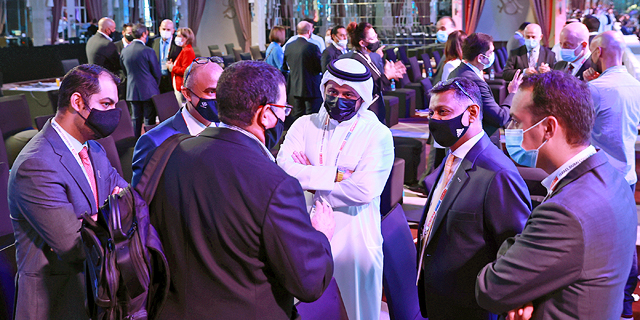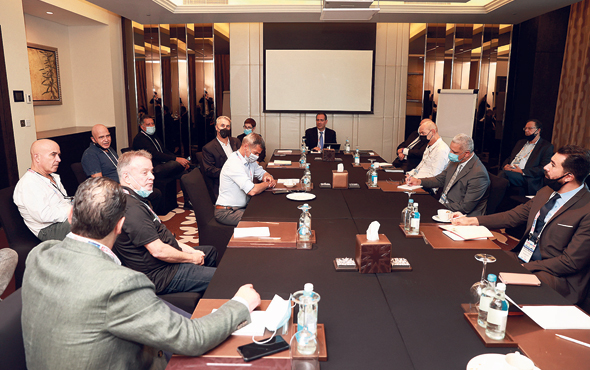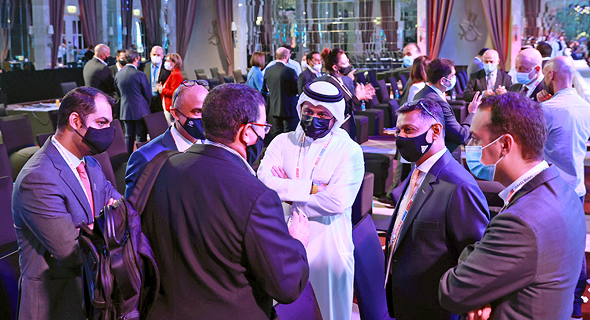
Dubai Conference
“Israel will soon become a central axis for trade, just like it was during the Ottoman Empire”
Israeli and Emirati business people took part in a series of roundtable discussions on various ways to cooperate
Naomi Zoreff, Irit Avisar, and Ron Friedman | 17:25, 29.11.20
Hospitality and Retail Roundtable
“Soon Israel will be a major axis for the transportation of goods, like in the days of the Ottoman Empire”
Industrial Manufacturing Roundtable
“It is clear that Israelis are serious business people who came here to work”
Business cards traded hands quickly at the roundtable dedicated to industrial manufacturing, led by Leumi Partners CEO Avi Ortal. “Israel may not have the cheapest products, but they are of high quality and it is clear that Israelis are serious business people who came here to work,” said Henrik Christiansen, CEO of Exceed Industries. Panelists also discussed the food industry. Ezra Cohen, the owner of Gad Dairy, was able to identify potential opportunities with a few Emirati company representatives and develop plans to export products to Africa and Asia. While Israelis were disappointed with the fact that the government doesn’t sufficiently encourage manufacturing and prefers to concentrate on the tech sector, the UAE counterparts said it remains a backbone of their economy and are looking to increase its significance by establishing an aviation production center. Airbus and Boeing already have factories in the country. Real estate Roundtable “Maybe its imaginary wealth” Despite the curiosity between Emirati real estate representatives and their Israeli counterparts, it seemed as if the only possible path for cooperation lay a long way ahead. Walid El-Hindi, CEO of Bloom Properties said that the Emirati market is still young, but competition has recently increased. He suggested that it was important for construction companies to cooperate with one another, whether commercial or residential. El-Hindi was asked to estimate the cost of office buildings in the Emirates, which he said came out to eight times the amount in Israel, some NIS 800 ($240) per square meter (11 square feet), being a riskier business. The gross profit in residential projects stands around 25%-30%, which otherwise would not be worth it for local entrepreneurs. El-Hindi and his colleague Saad Erekat said that banks in the Emirates have become more conservative in financing real estate projects due to high competition. The pandemic has led to a drop in real estate prices in the Emirates and has created additional buying opportunities at a time when the market can recover after the crisis, but is characterized by advanced infrastructure that is constantly developing. The Israeli counterparts were impressed by this and noted that the Israeli government could learn a lesson from the Emirates. Real estate prices in the UAE dropped before the crisis, and from 2018-2019, the oil prices dropped as well, and this year recorded a slump. As for potential buyers, they noted that 85% of homeowners in Abu Dhabi are Emirati citizens, while in Dubai the percentage of foreigners who conduct real estate business deals - either for investments or living - is much higher. The average leases in commercial areas are for nine years, with the average being anywhere from three to five years with an option to extend a lease. As for cooperation, the sides talked about the field of entrepreneurship, and the Emirati party noted that at this stage, what they would seek from their Israeli partners is funding. It was an interesting point, or as one Israeli put it: “Perhaps all their wealth is imaginary, while we Israeli construction companies which have more access to finance.” One idea that came up was to build a shared community complex for Israelis who travel to Dubai for business, based on the assumption that a project that was less specifically tailored would have less of a chance to succeed.
